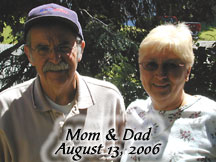A few weeks ago, my dad got out of bed to use the bathroom. It's 2-3 steps from the bedroom to the bathroom door. He peed on the wall in the hallway and went back to bed. Who knows what he was thinking?
This past Friday, my husband and I were both over there because something's wrong with my mom's computer and we were trying to fix it. All of us-dog, cat, mom, dad, me, hubby-were all downstairs. My husband was working on the computer, I was sitting next to him, my mom was sitting on the stairs and the dog was harassing the cat in the other room. My father picked up a folder labeled "driver's licenses" and started showing it. My mom caught a glimpse of what was inside-40 year old driver's licenses, including her original learner's permit. She was flabbergasted and asked my father where he got them. "That's my old license!"
He pulled the folder away. "I've had these since 1961!" (They didn't even KNOW each other in 1961.) She tried to explain that she didn't want it back, she just wanted to know where he got it. He clutched the folder like it was full of gold and yelled "I don't even know who you are!" right in my mother's face. She just sat there for a moment and then she said, "I know," and went upstairs. It was so awful, words can't describe it.
Then he came over to me and started saying how "they" always try to take all his stuff (meaning my mom) and said, "It's okay if YOU look," offering me the folder. I looked--I never saw a driver's license that old, basically just a typed piece of paper like an old-fashioned library card. My husband was just sitting there with his mouth hanging open like he couldn't believe what my dad had said. I said to my father, "You do know who she is. That's your wife. That's Ann."
"I know," he admitted, and took the folder back.
in the news:
Scientists identify Alzheimer's gene
A huge international study has identified a gene that apparently can raise the risk of developing the most common form of Alzheimer's disease, a discovery that may help scientists develop new treatments.
Scientists analyzed DNA from more than 6,000 people from a variety of ethnic groups and found evidence implicating certain versions of the gene, called SORL1.
It's too soon to tell how much those gene versions raise the risk of getting Alzheimer's, or what percentage of cases they account for, the researchers said.
They said the effect on risk appears to be modest.....
The study... focused on Alzheimer's that appears after age 65, the most common type.
Only one gene, called APOE, has been firmly linked to raising susceptibility to the common form. A Harvard-based group lists about 20 other genes it considers promising candidates, based on research.
...The new paper implicates SORL1 in Alzheimer's in two ways.
First, it shows that inheriting certain variants was associated with developing the disease in seven out of nine samples of people examined. The association appeared in African-American, Caribbean Hispanic, northern European and Israeli Arab groups.
In laboratory studies, researchers also found that when they suppressed the activity of SORL1, cells made greater amounts of amyloid beta, a substance thought to play a key role in causing Alzheimer's.
Researchers believe the disease-promoting variants of SORL1 act by suppressing the gene's activity.
Living in the Shadow of Alzheimers
5 years ago

